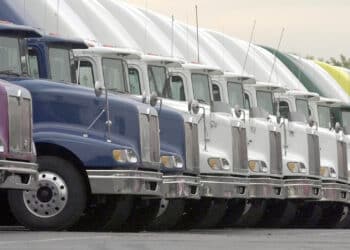The Biden administration has authorized California regulations that compel the sale of zero-emission vehicles over the next decade and ultimately ban the sale of conventional, gasoline-powered cars in 2035.
President-elect Donald Trump has vowed to “terminate” electric vehicle mandates, and his administration is expected to swiftly seek to revoke the approval. Yet Wednesday’s action by the Environmental Protection Agency threatens to complicate that maneuver, keeping pressure on automakers to comply with California’s requirements, potentially for years to come.
The approval also represents one of the most sweeping climate policy moves by President Joe Biden, helping burnish his green bona fides weeks before he departs the White House.
The California requirements are expected to slash planet-warming pollution, more than halving greenhouse gas emissions from light-duty vehicles in the state by 2040. They’ll also apply outside of California, in New York, Washington and other states that have opted to follow the mandates, which together account for roughly 30% of the American vehicle market.
EPA Administrator Michael Regan stressed the approval was aligned with US law that has for decades given California special powers to regulate auto pollution. While the Clean Air Act bars most states from adopting their own auto emission limits, Congress exempted California, a recognition of its continuing problems with smog.
The law directs the EPA to grant waivers for California auto emission regulations except in select circumstances, such as when they’re deemed arbitrary or unnecessary to meet “compelling” conditions in the state. And once those waivers are issued — something that’s happened more than 100 times over the past five decades — the underlying regulations apply in California and any other states that opt to follow them.

“California has longstanding authority to request waivers from EPA to protect its residents from dangerous air pollution coming from mobile sources like cars and trucks,” Regan said in a press release. “Today’s actions follow through on EPA’s commitment to partner with states to reduce emissions and act on the threat of climate change.”
The waivers issued Wednesday apply to two California programs. One limits nitrogen oxide pollution from heavy-duty vehicles and engines. The second, known as the “Advanced Clean Cars II” program, imposes pollution curbs on conventional combustion-engine cars meant to stifle the release of soot and smog-forming compounds. The initiative also requires automakers to sell an escalating percentage of zero-emission vehicles, set at 35% in 2026 and growing to 100% in 2035.
Carmakers, auto dealers and fuel producers blasted the move, calling the quotas unachievable. The Alliance for Automotive Innovation insisted it will “take a miracle” to meet them.
Vehicles that qualify as zero-emission under the program include battery-electric, hydrogen fuel cell and plug-in hybrid cars. Traditional hybrid cars and trucks — as well as conventional cars fueled by gasoline and diesel — don’t meet the standard.
“These policies will harm consumers — millions of whom don’t even live in California — by taking away their ability to buy new gas cars in their home states and raising vehicle and transportation costs,” said Chet Thompson, president of the American Fuel and Petrochemical Manufacturers association.
Nationwide, just about 10% of new light-duty vehicle sales are electric models. Even in California, which has invested heavily in the green transition, sales of zero-emission vehicles made up less than 30% of new light-duty vehicle registrations during the second quarter.
To fulfill quotas, carmakers can sell more zero-emission vehicles, sell fewer vehicles overall or buy credits from rivals that overcomply with the mandates. That’s a potential benefit for EV-focused manufacturers such as Tesla Inc., Rivian Automotive Inc. and Lucid Motors Inc., but a challenge for legacy automakers such as Ford Motor Co., and General Motors Co. “No incumbent automaker is going to have an easy time complying with these sales mandates,” predicts the Alliance for Automotive Innovation.
The requirements, which build on an existing California program mandating some zero-emission vehicle sales, are set to coincide with an anticipated surge in electricity demand from EVs, data centers and manufacturing plants.
California Governor Gavin Newsom struck a confident tone Wednesday, stressing the growing options for consumers.
“Automakers and manufacturers have made it clear they intend to stick with California and consumers as we move toward clean cars that save people money,” he said in an emailed statement. “Naysayers like President-elect Trump would prefer to side with the oil industry over consumers and American automakers, but California will continue fostering new innovations in the market.”
The EPA’s action sets up clashes over the rules that are likely to shape the auto industry’s decisions about new models, sale strategies and investments for years to come.
While Trump’s EPA can move to repeal the waivers administratively, it could take months to fully justify the reversal, much less defend it from expected legal challenges in court.
To accelerate the shift, Republican lawmakers are being encouraged to repeal the waiver using special authority under the 1996 Congressional Review Act. Biden’s EPA asserts its latest actions aren’t subject to that law, and the Government Accountability Office previously ruled a waiver reversal was outside the review act’s scope. But waiver opponents are lobbying lawmakers to test that interpretation in the new year, arguing the move is essential to protect consumer choice.
“Americans should be free to choose the types of cars and trucks that best suit their needs, not ones that bureaucrats in Washington, DC and Sacramento dictate to them,” said Tom Pyle, president of free-market advocacy group the American Energy Alliance.
The auto alliance is already encouraging states to abandon plans to follow the California mandates, warning that otherwise, they’ll face fewer vehicle options and higher costs.
“To achieve the California mandate, it would require dealers selling over three times as many ZEVs as they currently do,” Toyota Motor Corp. said in an emailed statement. “If a customer cannot afford a zero-emission vehicle or it doesn’t meet their needs, there may not be a non-electric vehicle on the lot to purchase for their mobility needs.”
— By Jennifer A. Dlouhy (Bloomberg)









